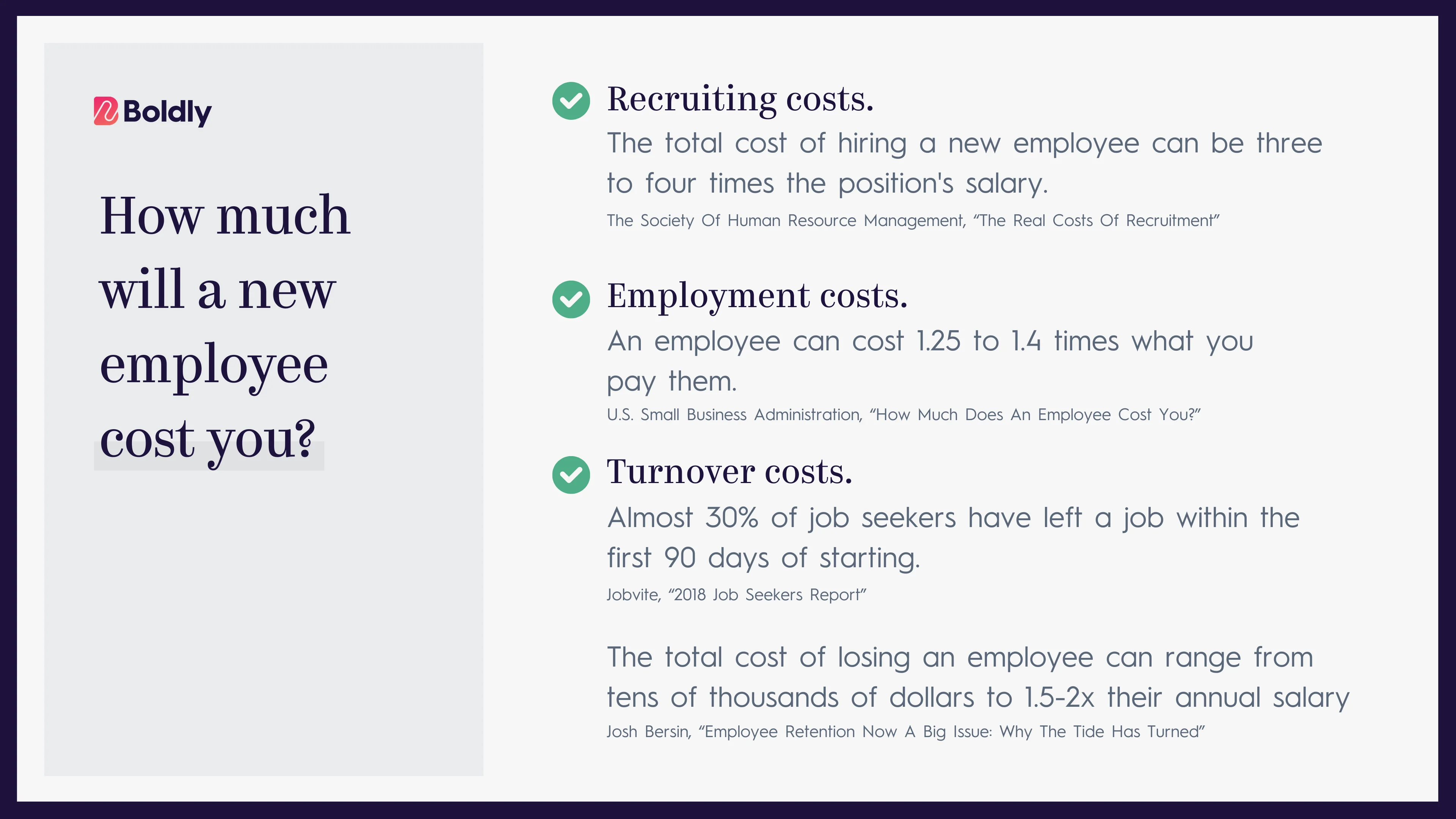Executive assistants are the key partners that keep leaders on track and focused on moving business objectives forward.
“I was able to increase my productivity easily by 15–20% when I brought my Boldly executive assistant on board — she saved me that much time,” said Stu Loeser, founder of Loeser & Co. and Boldly client since 2015.
But should this critical position be handled in-house or are you better off outsourcing this position?
In short, it comes down to:
- How soon do you need support?
- Do you want someone in-office or remote?
- What is your budget?
- How much time and effort are you prepared to invest in the hiring process?
Hiring in-house invariably takes more time and requires more effort upfront, not to mention the costs of hiring combined with the costs of bringing on an employee. In fact, SHRM reports that the total cost to hire a new employee can be three to four times the position’s salary.
Outsourcing can be a quicker, more cost-effective alternative (especially if you don’t need someone full-time), but you’ll still need to do your own due diligence and research on the individual or company you’re sourcing from. Not to mention the compliance risks.
Luckily, there’s a third option that gives you the best of both worlds — premium subscription staffing. This new hiring model gives you access to personally matched, highly experienced fractional executive assistants without any hiring headaches or compliance issues. Best of all, you can be up and running in about a week.
We’ll take a closer look at all your options for hiring in-house vs. outsourcing admin, including pros and cons, so you can make the best decision.
The Costs Of Hiring In-House And The Benefits Of Outsourcing


It seems pretty straightforward, the difference between going in-house or outsourcing.
As a business owner or senior exec, it might seem that going in-house is the safest route and the one where you’d have the most control of the process and output.
However, hiring in-house comes with significant costs in:
- Time
- Money
- Risk of turnover
Recruiting takes time and money. Interviews eat up the calendar and clock just to find a potential employee. Team member training and onboarding can be expensive. Let’s not forget benefits and payroll expenses.
It doesn’t stop there.
The US Small Business Administration estimates that, ultimately, an employee costs you 1.25 to 1.4 times what you pay them.
That’s tough to hear when you’re in a position of growth and you can’t afford not to get additional help.
Read more: How Much Does An Executive Assistant Cost?
Use Executive Assistants To Free Up Time For Important Projects
There are two basic roadblocks for most leaders when it comes to outsourcing:
- Quality and security issues.
- The headache of dealing with outsourced team members (pay, legal compliance, longevity, onboarding, etc.)
If the thought of outsourcing work on complicated projects makes you a little anxious, that’s understandable.
Dealing with contractors, temp agencies, or overseas project-based help comes with a significant burden.
Things like privacy, security, and compliance with employment laws regarding 1099 contractors are just a few things that come to mind. It’s important to remember that outsourcing takes many forms.
Not all outsourced options are created equal, in other words.
This is where subscription staffing starts to shine. Using a remote executive assistant from Boldly mitigates these concerns.
Defining An In-House Team Vs. Outsourced Employees
At its most basic, an in-house team is what you know best. It’s your own in-house employee, the staff you have working with you now. You hired them directly, and they’re on your payroll.
Outsourcing team members means using an external team, such as a freelancer, independent contractor, staffing agency, temp agency, project-based hire (think: Fiverr and UpWork), or a mix of each.
Outsourcing, whether for specific projects or for positions, is a fast way for a company to stay competitive by getting the help they need without the long process (and expense) of hiring.
When Should A Company Use An In-House Team?
There are advantages to building internal teams.
When you hire your own employees, you’re building a team that fits your specific requirements, hiring people who meet your standards. In-house teams are plugged into your company culture, and know how internal processes work.
If you find the right external partner, this can still be true — but temporary workers and freelancers seldom fit this bill like an in-house hire.
A more important question might be to ask what your business objectives are.
That is, what aspects of your company seem to naturally require a dedicated team that’s only working for you?
Using in-house staff makes the most sense when:
- Client privacy or protecting proprietary information is mission critical.
- Projects are specialized enough to require in-house specialists.
- A complex project requires direct and immediate access to your team at a moment’s notice.
- You need specific availability from your team, whether that is in time or location.
Building internal teams is a long-term commitment, and is best suited for situations where you are on a consistent growth track, steady budget, and without the need to remain flexible or adapt quickly to sudden changes.
When Is A Staffing Service Or Outsourced Option Ideal?
There are times when outsourcing is the best choice.
Outsourcing provides you access to a larger pool of talent to choose from than you might be able to find locally or within your current team.
Because of the many options you have for outsourcing, whether project or position-based, you can find a competitive advantage by finding the best fit.
Outsourcing a team member makes the most sense when:
- You need help immediately, and don’t have time for the full hiring process.
- Cost savings is important, and your budget doesn’t or needs don’t fit hiring in-house team members.
- You need specialized experience that your in-house team doesn’t have.
- You have one-off projects that don’t warrant new hires, but the work still needs done.
- Your industry or situation fluctuates up and down and makes hiring strategy difficult right now.
- You need help with basic admin tasks.
- You need a talented, high-level executive assistant with the flexibility to increase or decrease hours as needed.
Outsourcing gives you flexibility during times of growth or sudden changes when you need to build out or contract your team quickly.
Comparing Boldly vs. Hiring In-House Executive Assistants
In-House
Understand your risks
Let’s rewind for a minute. Why are you outsourcing an executive assistant in the first place?
The ROI of an executive assistant starts with one question: What’s your time worth? If it takes you more hours to hire, onboard, or manage than it saves, you’re not gaining anything.
At Boldly, we’ve built our model to eliminate those pain points. Our executive assistants are W2 employees, US-based, and deeply experienced, often with C-suite or Fortune 500 backgrounds. They’re vetted, trained, and ready to integrate into your culture so you can focus on leadership, not logistics.
Here’s how Boldly stacks up against hiring one or more executive assistants in-house:
- Compliance & risk: Boldly handles all employment responsibilities. Even with the best virtual assistant companies or freelancers, the risk often falls on you. With in-house, you take on every compliance obligation directly.
- Benefits & training: Our team members receive competitive pay, a matched 401k, paid holidays, and continuous training. With in-house hires, you’re responsible for the full package.
- Overall cost: Boldly uses a transparent, all-inclusive hourly rate that covers everything — no surprise fees, no start-up costs, no overhead. In-house means you’re paying for salary plus taxes, benefits, and overhead.
- Time to get started: With Boldly, you’ll be matched and onboarded in about two weeks. Hiring in-house can stretch to one or two months, or longer!
- Talent quality & stability: Our assistants average 4+ years of tenure, so you get consistency and commitment. In-house stability depends entirely on your retention strategy.
- Availability & coverage: Boldly offers flexible hours with trained backup coverage during vacations. An in-house hire leaves you to solve coverage gaps on your own.
Hiring in-house can make sense in some situations, but it almost always means higher costs, longer timelines, and more management overhead.
Boldly is designed to give you the best of both worlds. Premium talent, complete flexibility, and none of the headaches.
In less than two weeks, you can start freeing up your time and focusing on what really matters: running your business, not chasing your to-do list.




